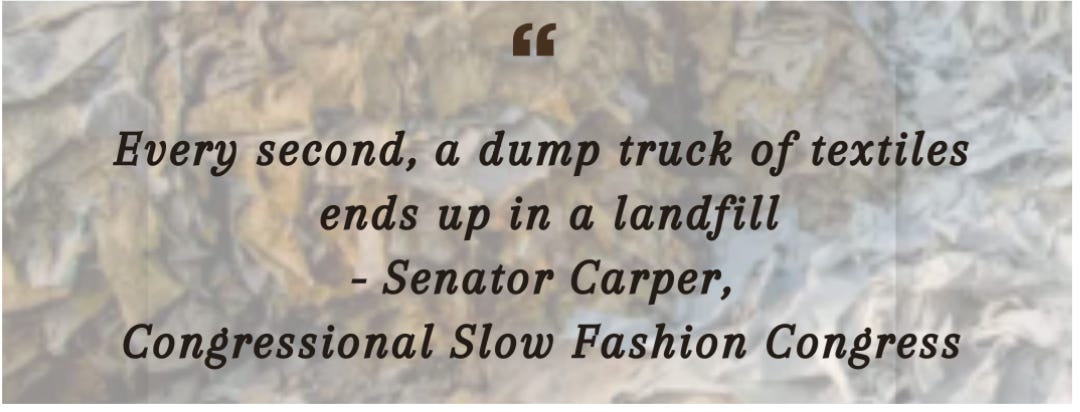tldr; On Global Recycling Day (March 18), we are drawing your attention to a rapidly growing opportunity - Textile Recycling.
Author: Kirthika Padmanabhan (Climate Capital)
Contributor: Sruthi Madhavan (Strategy&, PwC)
Before we dive in…
Unlock the knowledge and skills to help you become a successful investor with Climate Angels - an immersive 6-week program. Designed for aspiring angel investors, this experience runs from March 20 to April 24, featuring weekly 90-minute sessions packed with expert insights, hands-on learning with Climate Capital Partners & exclusive guest talks. Two of six sessions will focus on exciting investment areas in the current market. Apply by tomorrow, March 19.
Climate Capital has invested in 400+ climate startups since 2015. Co-invest with us.
🚨 Let’s size the problem first:
An average American consumer throws away 81.5 pounds of clothes every year. Every year an estimated 92M Tonnes of textiles waste is generated and this number is growing rapidly, getting dumped in landfills or in the global south.
~10% of global GHG emissions ($1.2B Tonnes) are contributed by the textile industry, growing at 50%. That’s bigger than the emissions of the maritime and shipping industries’ companies
35% of microplastics in the ocean come from synthetic fibers and ~20% of global waste water pollution comes from the textile industry
♻️ Big problem indeed - let’s look at the Waste-to-Value Opportunity.
The textile industry's "take-make-waste" model is broken. With $500 billion lost annually from underutilized clothing and less than 1% of textiles are recycled, the inefficiency is staggering. A shift to circularity (recycling, reselling, repurposing) is being driven by,
Market size: The $2T+ Textile industry is growing rapidly, estimated to be $3T by 2030 producing over 100B garments annually.
Regulatory Tailwinds: Extended Producer Responsibility (EPR) laws led by EU and by California and New York in the US are putting pressure on textile brands as these laws directly impact operational costs and market access.
Technological advancements like AI-powered sorting, and chemical fiber-to-fiber recycling further unlock the potential for scale. Platforms that facilitate circular transactions generate network effects, creating a self-reinforcing cycle of growth and profitability.
Supply Chain Resilience: Recycling reduces reliance on volatile raw material costs, positioning circular textile startups as essential future suppliers
Consumer Adoption: Sustainability is now a competitive differentiator, with consumers actively seeking sustainable products.
💰 Investment opportunity in Textile Recycling:
According to Fashion for Good, Apparel Impact Institute and other industry organizations, there is a $1T decarbonization investment opportunity to enable the textile industry to meet its net zero goals. This involves both scaling existing solutions and investing in new innovations across financing solutions.
Below is a quick view of some of the themes of innovations across the textile value chain. Innovative fibers from seaweed (Keel Labs), Unspun’s 3D weaving Technology, Alchemie Technology’s waterless smart dyeing, Smartex’s modern textile factory, Indyx’s digital wardrobe, Retraced digital product passport to name a few examples.
As each of these areas needs a deep dive, for today, let’s talk about Textile (fiber-to-fiber) Recycling. VC capital continues to come up as a need for bridging the innovation gap and to accelerate recycling innovations. Of the $1T financing opportunity identified, approximately $82B opportunity exists in the category of next-generation sustainable and recycled materials, prime for VC investments (risk/return profile).
An emerging list of VCs are leading the charge with investments in Textile Circularity - At One Ventures, Alante Capital, Climate Capital, SOSV, Anthropocene Ventures, Closed Loop Partners, Regeneration.VC etc have led early stage investments. In addition, Corporate VCs e.g Ingka Investments (Ikea) has earmarked €667M to focus on textile waste. Brands like H&M and Patagonia are also leading investments and partnerships with recyclers.
Here are a few select (2024-2025) VC investments in Textile recycling technologies in the last 12 months:
Other companies that raised in 2024 include:
The future of textiles is circular, and the industry is being re-spun. Brands are stepping up with collaborative partnerships, innovators are ready to scale, industry organizations are leading research and consumers demand change. For investors, turning waste into value is a clear call to action now. Don't let your portfolio miss this essential thread! 🧵👗♻️
––
Note: The Author’s opinions are their own and not necessarily representative of Climate Capital.
Disclaimer: Under no circumstances should any information or content in this email be considered an offer to sell or solicitation of interest to purchase any securities, including any securities advised by Climate Capital or any of its affiliates or representatives. Further, no content or information herein is or is intended, nor should it be construed as, an offer to provide any investment advisory service, financial advice, legal, tax, accounting, investment, or other advice from Climate Capital or any of its affiliates (collectively "Climate Capital”). Under no circumstances should anything herein be construed as fund marketing materials by prospective investors considering investing in any Climate Capital investment fund. Content contained herein does not constitute an offer to sell — or a solicitation of an offer to buy — any securities and may not be used or relied upon in evaluating the merits of any investment. Information regarding companies highlighted herein has been provided by third parties, and Climate Capital makes no representations or warranties as to its accuracy, as to the viability of any company listed herein, or the results of any investment in a listed company.















